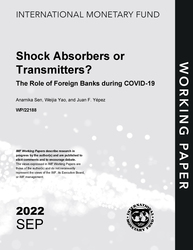
Shock Absorbers or Transmitters? The Role of Foreign Banks during COVID-19
Shock Absorbers or Transmitters? The Role of Foreign Banks during COVID-19
READ MORE...
Volume/Issue:
Volume 2022
Issue 188
Publication date: September 2022
ISBN: 9798400222030
$20.00
Add to Cart by clicking price of the language and format you'd like to purchase
Available Languages and Formats
| English |
Prices in red indicate formats that are not yet available but are forthcoming.
Topics covered in this book
This title contains information about the following subjects.
Click on a subject if you would like to see other titles with the same subjects.
Banks and Banking , Economics- Macroeconomics , Money and Monetary Policy , Economics / General , Policy announcements , financial conditions , credit , ownership , capital , liquidity , COVID-19 , , bank ownership , ownership data , bank behavior , bank characteristic , domestic bank , bank size , Foreign banks , COVID-19 , Bank credit , Credit ratings , Global , Central America , Central and Eastern Europe
Summary
This paper studies whether bank ownership influenced lending behavior during the COVID-19 shock. It finds that, similar to previous episodes of financial distress, foreign banks appear to have played a shock-transmitting role, as there was a sharp slowdown in lending by foreign banks’ affiliates relative to domestic banks. However, given the uniqueness of the COVID-19 shock and the impact of lockdowns on economic activity, foreign banks were found to lend at a higher rate than domestic banks once the stringency of mobility restrictions is accounted for, with their lending portfolio concentrated more in the corporate sector. Results also suggest that the difference in lending rates between foreign and domestic banks could be explained by the heterogeneous effects of policy measures in response to the pandemic. In jurisdictions with more stringent mobility restrictions, policy interventions actually encouraged higher lending by foreign banks. These findings suggest that foreign bank presence may have acted as a shock absorber in jurisdictions where economic activity was most affected by the pandemic.



